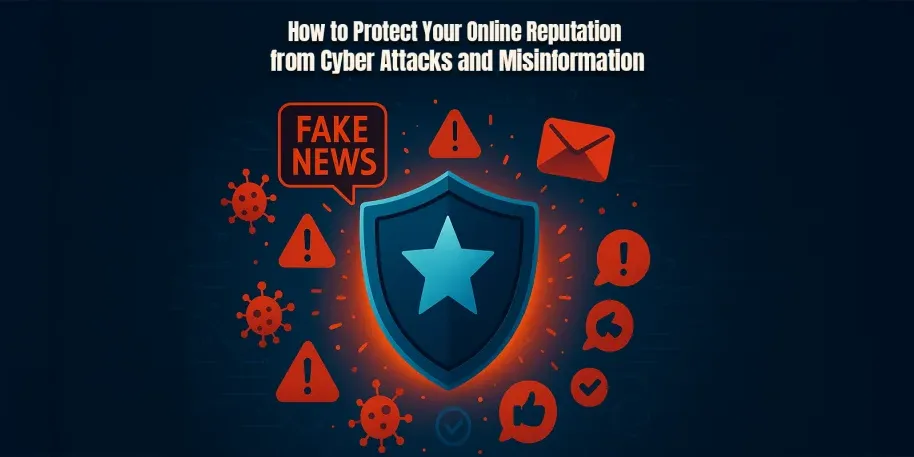

How to Protect Your Online Reputation from Cyber Attacks and Misinformation
Posted March 13, 2025 by Kevin Chern
In 2023, a mid-sized software company found itself in the midst of an online crisis. A fake news article falsely claimed their software had a critical security flaw, leading to mass customer distrust and lost sales. Before the company could respond, the misinformation had spread across forums and social media. The damage? A 15% drop in revenue in a single quarter and a tarnished reputation. It took months of reputation management, public statements, and cybersecurity reinforcements to recover.
This scenario is not unique. Cyber attacks and misinformation are not just threats to large corporations; they affect businesses of all sizes. If your online reputation is not actively managed and protected, it is vulnerable to cybercriminals, false narratives, and brand impersonators.
How can business owners safeguard their online presence in this digital battlefield? Let’s break it down.
The Growing Threat of Cyber Attacks and Misinformation
In today’s digital-first world, businesses are only as strong as their online reputations. The rise of social media, review platforms, and automated news aggregators has made it easier than ever for misinformation to spread. Cybercriminals exploit this by launching reputation-damaging attacks through methods such as data breaches, fake reviews, and online smear campaigns.
The Hard Numbers:
- Misinformation spreads 6 times faster than factual news on social media (MIT Media Lab, 2023).
- 60% of small businesses shut down within six months of a cyber attack (National Cyber Security Alliance).
- 45% of consumers won’t buy from a company with negative online reviews, even if the reviews are unverified (BrightLocal, 2023).
- Over 80% of brand impersonation attacks involve fake social media accounts (Digital Shadows, 2024).
Ignoring online reputation management is like leaving your house unlocked in a bad neighborhood—sooner or later, trouble will find you.
Common Cyber Threats That Harm Your Online Reputation
1. Fake Reviews & Smear Campaigns
Competitors, disgruntled customers, or even cybercriminals can flood your business profile with negative reviews, damaging credibility.
Prevention:
- Monitor reviews regularly using tools like Google Alerts and ReviewTrackers.
- Respond professionally and factually to negative reviews, avoiding emotional responses.
- Encourage real customers to leave positive reviews to outweigh fake ones.
2. Social Media Attacks & Brand Impersonation
Fake profiles masquerading as your business can scam customers, spread misinformation, and damage trust.
Prevention:
- Verify all official business accounts.
- Use tools like Brandwatch or Hootsuite to detect impersonation.
- Report and remove fake accounts immediately.
3. Cyber Attacks & Data Breaches
Hackers target businesses to steal customer data, leak sensitive information, or deface company websites.
Prevention:
- Implement strong cybersecurity measures like two-factor authentication (2FA) and endpoint protection.
- Regularly update software and train employees on phishing awareness.
- Have a data breach response plan in place.
4. Misinformation & Fake News
False claims about your business can spread rapidly, impacting sales and trust.
Prevention:
- Monitor mentions of your brand using Google Alerts, Mention, or Meltwater.
- Have a crisis communication plan with pre-approved statements ready.
- Correct misinformation quickly and visibly on social media and official channels.
Best Practices to Protect Your Online Reputation
1. Develop a Reputation Monitoring System
You can’t fix what you don’t see. Set up an active monitoring system to track brand mentions, reviews, and social media chatter in real time.
Recommended Tools:
- Google Alerts – Free monitoring for brand mentions.
- Reputation.com – Comprehensive online reputation management.
- Hootsuite – Social media monitoring and engagement.
2. Proactively Manage Your Online Presence
Don’t wait for an attack build a strong, positive reputation before problems arise.
- Publish regular, high-quality content (blogs, videos, case studies) to control your narrative.
- Engage positively with your audience on social media.
- Showcase customer testimonials and case studies to build trust.
3. Respond Quickly and Strategically to Negative Events
The worst thing you can do during a cyber attack or misinformation crisis is go silent.
- Acknowledge the issue publicly and reassure customers you are addressing it.
- Provide facts, not emotions stick to clear, verified information.
- Engage directly with customers, but avoid legal or defensive language.
4. Strengthen Cybersecurity to Prevent Attacks
Preventative cybersecurity is often cheaper than damage control.
- Use strong passwords and enable multi-factor authentication (MFA).
- Regularly train employees on cybersecurity risks.
- Secure customer data with encryption and access controls.
- Partner with cybersecurity firms for audits and penetration testing.
5. Have a Crisis Management Plan
When a crisis hits, time is of the essence. A well-prepared response plan ensures you react quickly and effectively.
A solid crisis management plan includes:
- Pre-drafted public statements for common reputation threats.
- A chain of command for decision-making and media responses.
- A list of official brand spokespersons to ensure consistent messaging.
Turning Reputation Protection into a Competitive Advantage
Rather than seeing reputation management as a defensive move, think of it as a competitive advantage. Businesses that demonstrate transparency, security, and quick responsiveness build long-term brand trust.
The Trust Factor:
- 87% of consumers say transparency is a key factor in deciding which brands to support (Label Insight, 2023).
- Companies that recover well from a crisis see an average 20% increase in customer loyalty (Harvard Business Review).
- Reputation-strong brands can charge a 10-20% premium on their products (Forbes, 2024).
Proactive reputation management doesn’t just prevent loss it builds brand equity.
Final Thoughts
Your online reputation is an invaluable asset, but one cyber attack or misinformation campaign can dismantle years of hard work. Business owners must be proactive, vigilant, and resilient in managing their digital presence.
Are you prepared to protect your brand, or are you leaving your reputation vulnerable to attack?
Start building a resilient reputation strategy today. Talk to our compliance and reputation experts to protect your business before the next crisis hits.

Kevin Chern – CEO – Sanguine Strategic Advisors
After 30 years of building businesses while navigating some of the most complex paths to success, Kevin Chern founded Sanguine Strategic Advisors to lend his insight and experience to other serial entrepreneurs, small business owners and folks in need of a roll-up-your-sleeves innovator, deal maker and doer.
Tags:




